Headlamp Aiming Impala
Visual Aiming Procedure
Important: Some state and local laws specify requirements for headlamp aim. All
of these laws must be complied with when performing any headlamp aiming operations.
Headlamp aim should be checked:
| • | When a new headlamp capsule is installed |
| • | If service or repairs to the front end area have (or may have)
disturbed the headlamps or their mounting |
| • | The area will consist of a level surface large enough to allow
for a vehicle and an additional 7.62 m (25 ft) measured from
face of lamps to the front of the aiming screen. |
| • | The screen will be 1.52 m (5 ft) high x 3.66 m
(12 ft) wide with a matte white surface well shaded from extraneous
light, and properly adjusted to the floor on which the vehicle stands. Provisions
may be made for moving the screen so it can be aligned parallel with the
vehicle. |
| • | The screen shall be provided with a fixed vertical centerline,
two laterally adjustable vertical tapes, and one vertically adjustable horizontal
tape. |
| • | If a regular commercial aiming screen is not available, the screen
may consist of a vertical wall having a clear uninterrupted area approximately
1.83 m (6 ft) high and 3.66 m (12 ft) wide.
The surface should be finished with a washable non-gloss white paint. |
| • |
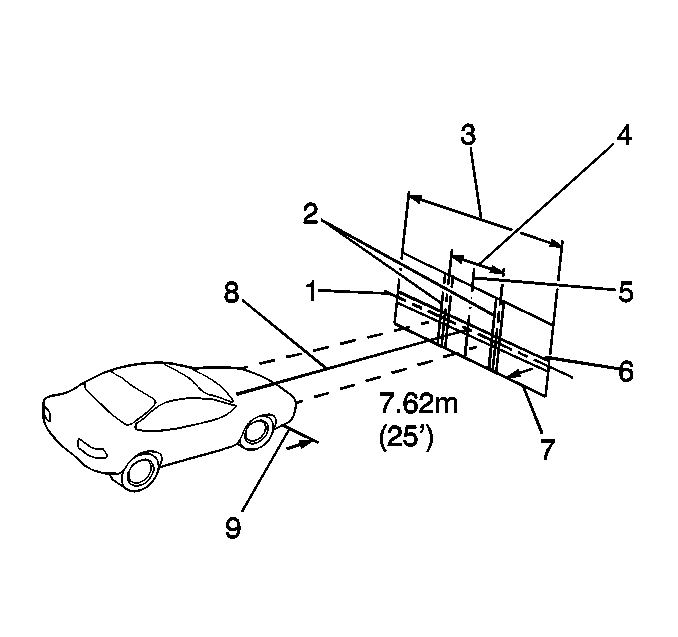
After the aiming screen
has been set up in its permanent location, it is necessary to paint a reference
line on the floor directly under the lens of the lamps to indicate the proper
location of the headlamps when they are being aimed: |
| - | Distance between headlamps (1) |
| - | Center line of screen (2) |
| - | Adjustable vertical pointer (3) |
| - | Adjustable horizontal tape (4) |
| - | Diagram of light screen (5) |
| - | Vertical center line ahead of right headlamp pointer position (6) |
| - | Adjustable vertical pointer |
| - | Horizontal center line of lamps |
| - | Vertical center line ahead of left headlamp |
Prior to aiming the headlamps, the following steps must be taken:
- Remove any snow, ice or mud from the vehicle.
- The vehicle must have a full tank of gas.
- Stop all other work on the vehicle.
- If any service has been performed on the vehicle, make sure that
all of the components are back in their original place.
- The vehicle must be on a level surface.
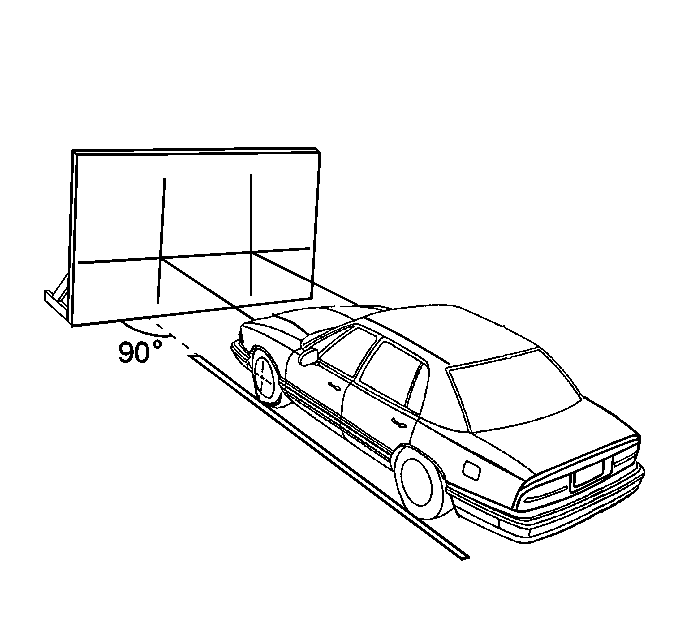
- The vehicle left tires
must be aligned with the reference line extending from the screen with the
headlamps aligned with the reference line.
- Do not load any cargo in the vehicle.
- The vehicle must contain one person or 72.56 kg (160 lb)
on the driver's seat.
- Inflate the tires to the proper pressure.
- Simulate the vehicle loads if the intended use of the vehicle
is for hauling heavy loads or towing a trailer.
- Rock the vehicle in order to stabilize the suspension.
- Turn on the headlamps to low beam and observe the left and the
top edges of the high intensity zone on the screen. The edges of the high
intensity zone should fall within the specifications.
Headlamp Aiming Procedure
- Open the hood.
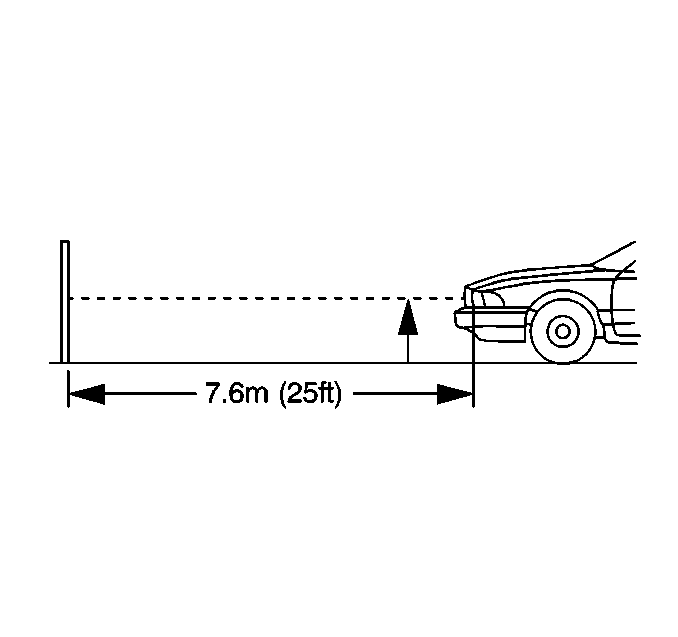
- Measure from the floor
to the center of the headlamp bulb. (Some headlamps have an aim dot marked
on the headlamp lens).
- At the screen, measure from the floor and place the horizontal
tape at the measured distance.
- Measure from the reference line on the floor to the left headlamp
bulb centerline.
- At the screen, measure from the reference line and place the vertical
tape at the measured distance.
- Measure from the reference line on the floor to the right headlamp
bulb centerline.
- At the screen, measure from the reference line and place the vertical
tape at the measured distance.
Important: Covering the headlamp not being adjusted will improve your ability to
see the beam being aimed.
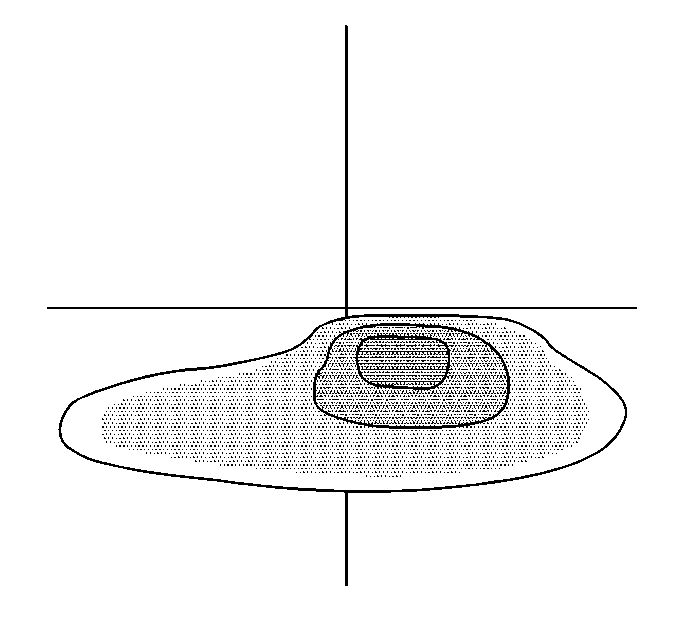
- Turn on the low beam headlamps
and cover the headlamp not being adjusted. The ambient light will allow the
beam cutoff to be seen on the wall.
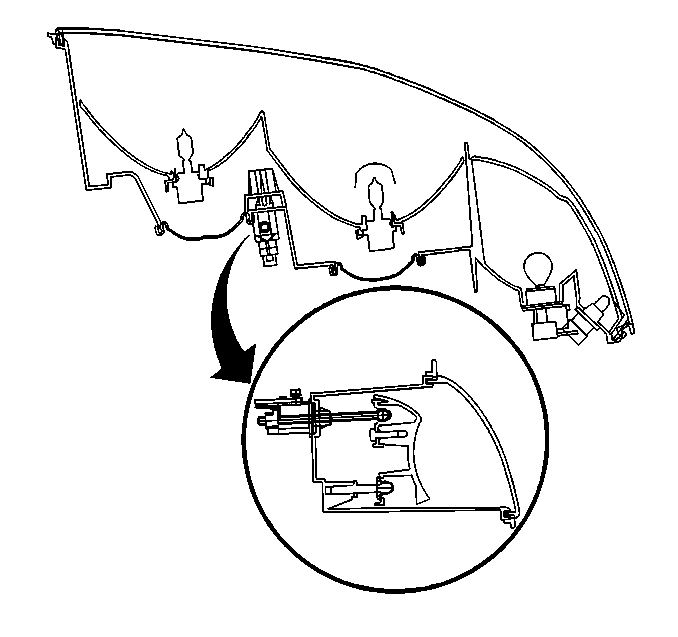
Important: Horizontal headlamp adjustment does not exist.
- Adjust the vertical aim of the headlamps to the specifications required
by the state and the local authorities, or as shown in step number 8.
- Close the hood.
Headlamp Aiming Monte Carlo
Aiming Headlamps (Visual Aim)
Important: Some state and local laws specify requirements for headlamp aim. All
of these laws must be complied with when performing any headlamp aiming operations.
Headlamp aim should be checked:
| • | When a new headlamp capsule is installed |
| • | If service or repairs to the front end area have (or may have)
disturbed the headlamps or their mountings |
Prior to aiming the headlamps, perform the following steps:

- The area will consist
of a level surface large enough to allow for a vehicle and an additional 7.6 m
(25 ft) measured from face of lamps to the front of the aiming screen.
The screen will be 1.5 m (5 ft) high x 3.6 m (12 ft)
wide with a matte white surface well shaded from extraneous light, and properly
adjusted to the floor on which the vehicle stands. Provisions may be made
for moving the screen so it can be aligned parallel with the vehicle. The
screen shall be provided with a fixed vertical centerline, two laterally
adjustable vertical tapes, and one vertically adjustable horizontal tape.
If regular commercial aiming screen is not available, the screen may consist
of a vertical wall having a clear uninterrupted area approximately 1.8 m
(6 ft) high and 3.6 m (12 ft) wide. The surface should
be finished with a washable non-gloss white paint. After the aiming screen
has been set up in its permanent location, it is necessary to paint a reference
line on the floor directly under the lens of the lamps to indicate the proper
location of the headlamps when they are being aimed.
| - | Distance between headlamps (1) |
| - | Center line of screen (2) |
| - | Adjustable vertical pointer (3) |
| - | Adjustable horizontal tape (4) |
| - | Diagram of light screen (5) |
| - | Vertical center line ahead of right headlamp pointer position (6) |
| - | Adjustable vertical pointer (10) |
| - | Horizontal center line of lamps (11) |
| - | Vertical center line ahead of left headlamp (12) |
- Remove any snow, ice or mud from the vehicle.
- The vehicle must have a full tank of gas.
- Stop all other work on the vehicle.
- If any service has been performed on the vehicle, return all of
the components to their original places.
- The vehicle must be on a level surface.

- The vehicle left tires
must be aligned with the reference line extending from the screen with the
headlamps aligned with the reference line.
- Do not load the vehicle.
- The vehicle must contain one person or 75 kg (160 lb)
on driver's seat.
- Inflate the tires to the proper pressure.
- Simulate the vehicle loads if the intended use of the vehicle
will be for hauling heavy loads or towing a trailer.
- Rock the vehicle in order to stabilize the suspension.
- Turn on the headlamps to low beam and observe the left and the
top edges of the high intensity zone on the screen. The edges of the high
intensity zone should fall within the specifications.
Headlamp Aiming Procedure
- Open the hood.

- Measure from the floor
to the center of the headlamp bulb. (Some headlamps have an aim dot marked
on the headlamp lens).
- At the screen, measure from the floor and place the horizontal
tape at the measured distance.
- Measure from the reference line on the floor to the left headlamp
bulb centerline.
- At the screen, measure from the reference line and place the vertical
tape at the measured distance.
- Measure from the reference line on the floor to the right headlamp
bulb centerline.
- At the screen, measure from the reference line and place the vertical
tape at the measured distance.
Important: Covering the headlamp not being adjusted will improve your ability to
see the beam being aimed.

- Turn on the low beam headlamps
and cover the headlamp not being adjusted. The ambient light will allow the
beam cutoff to be seen on the wall.
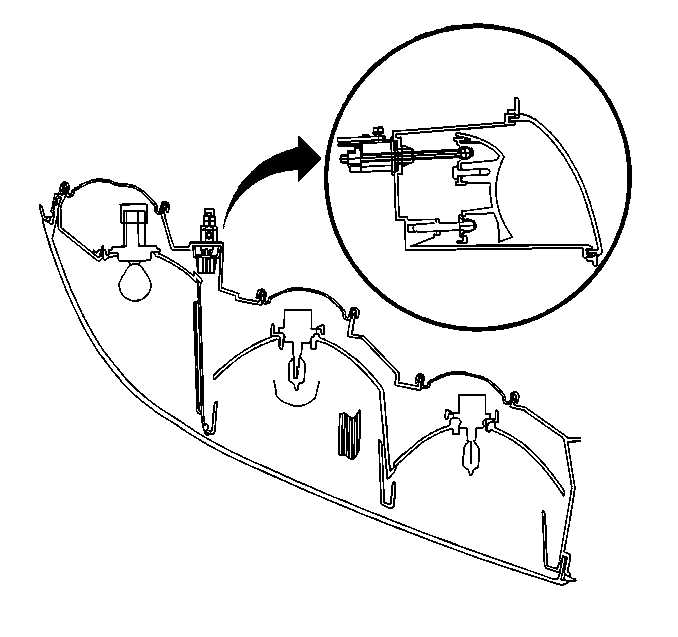
- Adjust the vertical aim
of the headlamps to the specifications required by the state and the local
authorities, or as shown in the graphic in step number 8.
- Close the hood.










